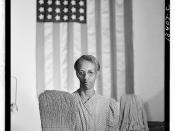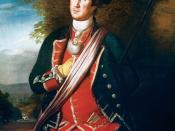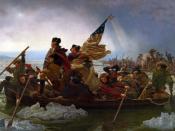George Washington was born in Westmoreland County, Virginia, on February 22, 1732. His early education included the study of such subjects as mathematics, surveying, the classics, and rules of civility. Washington's father died in 1743 and he went to live with his half brother Lawrence at Mount Vernon, Lawrence's plantation on the Potomac. Lawrence served as a father to him and his brother. Lawrence later died in 1752 and George ultimately inherited the Mount Vernon estate. George later on served in the French and Indian war. After this, he became a Virginia Politician. In January 1759 he married Martha Danbridge Custis, a wealthy and attractive young widow with two small children. It was to be a happy and satisfying marriage. He became a delegate to the first and second Continental Congress. Washington did not participate actively in the deliberations, but his presence was undoubtedly a stabilizing influence. In June 1775 he was Congress's unanimous choice as commander in chief of the Continental forces.
During the American Revolution Washington took command of the troops surrounding British-occupied Boston on July 3, devoting the next few months to training the undisciplined 14,000-man army and trying to secure urgently needed powder and other supplies. Washington occupied Dorchester Heights, effectively commanding the city and forcing the British to evacuate on March 17. He then moved to defend New York City against the combined land and sea forces of Sir William Howe. In the last months of 1776, desperately short of men and supplies, Washington almost despaired. He had lost New York City to the British; enlistment was almost up for a number of the troops, and others were deserting in droves; civilian morale was falling rapidly; and Congress, faced with the possibility of a British attack on Philadelphia, had withdrawn from the city.
Colonial morale was briefly revived by the capture of Trenton, a brilliantly conceived attack in which Washington crossed the Delaware River on Christmas night 1776 and surprised the predominantly Hessian garrison. Advancing to Princeton, he routed the British there on Jan. 3, 1777, but in September and October 1777 he suffered serious reverses in Pennsylvania at Brandywine and Germantown. After holding his bedraggled and dispirited army together during the difficult winter at Valley Forge, Washington learned that France had recognized American independence. In 1780 the war shifted to the south. Washington was still responsible for the overall direction of the war. After the arrival of the French army in 1780 he concentrated on coordinating allied efforts and in 1781 launched, in cooperation with the comte de Rochambeau and the comte d'Estaing, the brilliantly planned and executed Yorktown Campaign against British Army Leader Cornwallis, securing the American victory.
After the war Washington returned to Mount Vernon, which had declined in his absence. In May 1787, Washington headed the Virginia delegation to the Constitutional Convention in Philadelphia and was unanimously elected presiding officer. His presence lent prestige to the proceedings, and although he made few direct contributions, he generally supported the advocates of a strong central government. After the new Constitution was submitted to the states for ratification and became legally operative, he was unanimously elected president in 1789.



Only 8th Grade?
This is superb for an 8th-grader. My only criticism: where is the bibliography?
1 out of 1 people found this comment useful.